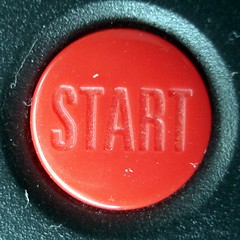Knowing where to start a story (or even a scene) is a fine art. Too early and we bore the reader. Too late and we confuse the reader (and then have to wedge in that much more backstory later). With backstory, the central issue is usually starting too early—we know these events will influence the story, but we still don’t want to start before the story “really” does. So how can we tell which events are backstory and which are story-story?
Two ways I can think of are focusing on:
- who our story is about (the protagonist) and
- what our story is about (the theme or the central events).
 Take Hamlet, for example: when the play starts, the story events are already in motion—his father is already murdered, and his uncle has already married his mother. But Hamlet’s story doesn’t start until his father’s ghost appears to call for vengeance, and that’s where we join him.
Take Hamlet, for example: when the play starts, the story events are already in motion—his father is already murdered, and his uncle has already married his mother. But Hamlet’s story doesn’t start until his father’s ghost appears to call for vengeance, and that’s where we join him.
Now, we could have started out watching Claudius plot and eventually murder Hamlet Sr., and marry Gertrude to assume the throne. But Shakespeare’s story wasn’t ultimately about the betrayal of family—it was about the consequences of inaction. Hamlet was his protagonist. (And that kinda made Shakespeare’s choice easy, since he needed Hamlet off at school when his dad was killed.)
Author Chris Roerden offers some more advice on where to find the beginning:
It’s where the first sign of trouble appears.It’s where a change threatens to upset the status quo. Mystery author and literary agent Jack Bickham says, “Nothing is more threatening than change. . . . Identify the moment of change, and you know when your story must open” (The 38 Most Common Fiction Writing Mistakes, 11-2; from Don’t Murder Your Mystery, 54).
Naturally, the backstory will set up the opening situation, as it does for Hamlet. Usually, at least some of those circumstances of the story created by the backstory should be quickly explained. We’d be awfully confused if it took a quarter of Hamlet’s story to discover that his dad is dead and his mother has already remarried. Of course, that doesn’t mean we have to explain everything in the opening lines. Backstory is more powerful when we save it as long as possible.
What do you think? How do you choose when to start your story?
Photo by Tom Magliery
